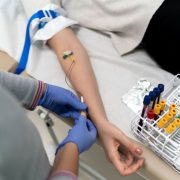Tens of thousands of pregnancies have resulted from rape in states where abortion is not a legal option, researchers estimate in a new study.
In the study, published Wednesday in the journal JAMA Internal Medicine, researchers from Planned Parenthood, Resound Research for Reproductive Health and academic institutions across the US used a combination of federal surveys on crime and sexual violence to estimate that there were about 520,000 rapes that led to 64,565 pregnancies in the time since abortion bans have been enacted in 14 states – ranging by state from four to 18 months ago.
Other research has found that there have been fewer than 10 abortions each month in states with bans, suggesting that most, if not all, victims were not able to get abortions in the states where they live, even those where the law allows exceptions for rape.
“Restricting abortion access to survivors of rape can have particularly devastating consequences,” the medical journal’s editors wrote in a note about the new research. “Whether these survivors of rape had illegal abortions, received medication abortion through the mail, traveled to other states, or carried the child to birth is unknown.”
About 1 in 5 adults in the US says that abortion should be legal in all cases, according to a 2022 survey from Pew Research Center. And a much larger majority – nearly 70% of adults – say abortion should be legal if pregnancy is the result of rape.
But experts say – and the new research suggests – that the realities of putting those exceptions into practice are challenging.
“Like many exceptions written into abortion bans, an exception for rape victims may appear to be a reasonable solution but in practice can create more trauma and danger for patients who have already experienced a traumatic event,” said Dr. Sami Heywood, an ob/gyn in Illinois and fellow with the advocacy group Physicians for Reproductive Health who was not involved in the new research.
“No other health care is reserved only for people who can prove a crime took place. That’s not an ethical way to practice medicine. It is cruel to force people who have already been victimized to jump through legal and logistical barriers that cause further harm.”
Health care providers may not always ask the question, and victims may not want to disclose this history, but even those who do may face additional challenges, experts say.
“Those who become pregnant after rape may take longer to recognize a pregnancy than other pregnant people, and there may be factors related to the trauma response that accounts for this,” said Dr. Rachel Perry, an associate professor of obstetrics and gynecology at the University of California, Irvine.
This delay may mean medication abortion – which may be used up to 10 weeks gestation – is not an option, and victims may have to travel particularly long distances to a provider, said Perry, who was not involved in the new study.
Also, rape victims often know their assaulter and may live with them.
“It may be especially impossible for them to travel out of state to get abortion care. It may be especially dangerous for them to try to order pills online the way that some people are doing,” said Dr. Samuel Dickman, medical director of Planned Parenthood of Montana and lead author of the new research. “It’s an added burden in so many ways.”
It’s difficult to measure how often sexual assault occurs, and Dickman acknowledges that the study includes many statistical assumptions. But part of the work is to raise awareness of a stigmatized issue and take an honest look at who may be affected by abortion bans and potential exceptions.
“If these numbers feel huge, that’s because they are,” he said. The estimates are “illustrating something that we see every day when working in reproductive health and abortion care but that may be under-appreciated by the broader public – and deliberately so by the kinds of people who implement bans on abortion care.”
Idaho is one of five states that have an exception for rape included in laws that otherwise ban abortion, and the new study estimates that there have been 1,436 pregnancies that resulted from rape in the 16 months since that law has been in effect.
“There’s exactly zero abortion access in that state,” Dickman said. “If that estimate is too high, what number would be OK? I don’t think any number would be OK there.”





